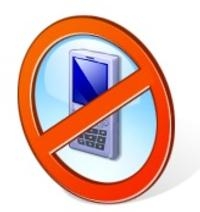Sat, Sep 08, 2012
Places The Burden For Their Ban In The U.S. On The FCC
As part of the FAA re-authorization bill passed by the congress earlier this year, Congress directed the Administrator of the FAA to conduct a study on the impact of the use of cell phones for voice communications in an aircraft during a flight in scheduled passenger air transportation. The agency was told to include a review of foreign government and air carrier policies on the use of cell phones during flight; a review of the extent to which passengers use cell phones for voice communications during flight; and a summary of any impacts of cell phone use during flight on safety, the quality of the flight experience of passengers, and flight attendants.

In its report, which the FAA released this week, the agency said that FCC regulations currently prohibit use of certain cellular telephones while airborne, and because of that, the FAA has not approved installation of on-board cellular telephone base stations, often called pico-cells, on US air carrier aircraft.
The FAA did identify several countries which do allow the use of cell phones on board airliners. The agency developed a questionnaire and sent it to those civil aviation authorities which allow their use. Those which responded included Australia, Brazil, France, Ireland, Jordan, Malaysia, New Zealand, Portugal, Saudi Arabia, the UAE, and the UK. The civil aviation authorities that responded said that there have been no confirmed occurrences of cell phones affecting flight safety on aircraft with on-board cellular telephone base stations. They also reported no cases of "air rage" or flight attendant interference related to passengers using cell phones on aircraft equipped with on-board cellular telephone base stations. Some passengers complained about the cost of the cell phone service, and when the cell phone service was inoperative or interrupted in flight.
The non-US civil aviation authorities who have approved the installation of onboard cellular telephone base stations on aircraft reported that the aircraft with these installations undergo extensive analysis, functional tests, ground tests, and flight tests to demonstrate that the cell phones and base stations do not interfere with aircraft systems. These aviation authorities reported that use of cell phones on aircraft while airborne is restricted by telecommunications authority regulations. Operators of aircraft with on-board cellular telephone base stations must have approval from telecommunication authorities before these systems can be used by passengers with their cell phones.
More News
Terminal Radar Service Area Airspace surrounding designated airports wherein ATC provides radar vectoring, sequencing, and separation on a full-time basis for all IFR and participa>[...]
Very High Frequency (VHF) The frequency band between 30 and 300 MHz. Portions of this band, 108 to 118 MHz, are used for certain NAVAIDs; 118 to 136 MHz are used for civil air/grou>[...]
“From approximately November 2021 through January 2022, Britton-Harr, acting on behalf of AeroVanti, entered into lease-purchase agreements for five Piaggio-manufactured airc>[...]
Also: Virtual FLRAA Prototype, IFR-Capable Autonomous A/C, NS-32 Crew, Golden Dome Missile Defense Bombardier announced that the first production Global 8000 successfully completed>[...]
Aero Linx: The 1-26 Association (Schweizer) The Association’s goal is to foster the helpfulness, the camaraderie, and the opportunity for head-to-head competition that is fou>[...]
 ANN's Daily Aero-Term (05.29.25): Terminal Radar Service Area
ANN's Daily Aero-Term (05.29.25): Terminal Radar Service Area ANN's Daily Aero-Term (05.30.25): Very High Frequency (VHF)
ANN's Daily Aero-Term (05.30.25): Very High Frequency (VHF) Aero-News: Quote of the Day (05.30.25)
Aero-News: Quote of the Day (05.30.25) Airborne 05.23.25: Global 8000, Qatar B747 Accepted, Aviation Merit Badge
Airborne 05.23.25: Global 8000, Qatar B747 Accepted, Aviation Merit Badge ANN's Daily Aero-Linx (05.30.25)
ANN's Daily Aero-Linx (05.30.25)



